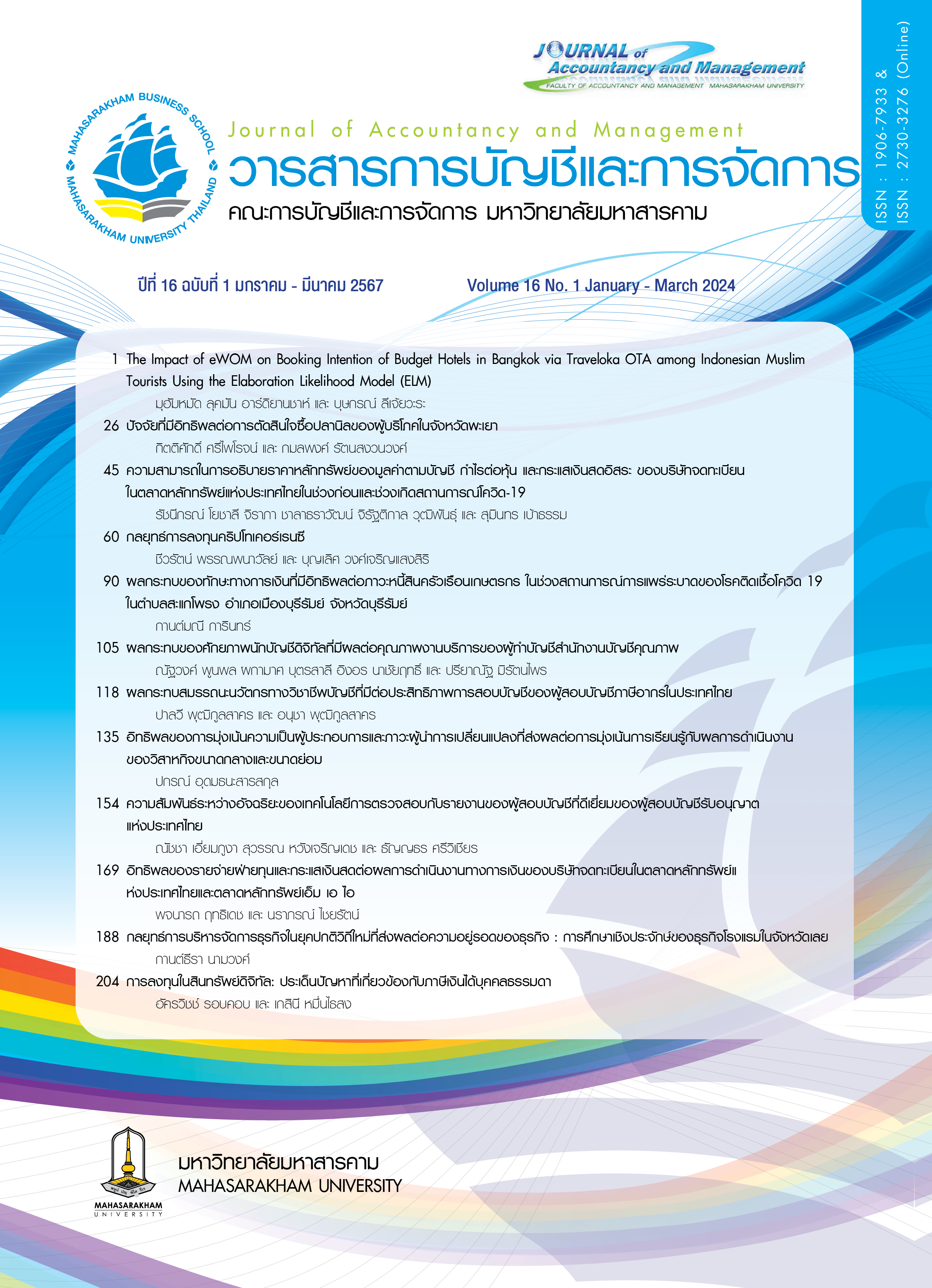ผลกระทบสมรรถนะนวัตกรทางวิชาชีพบัญชีที่มีต่อประสิทธิภาพการสอบบัญชี ของผู้สอบบัญชีภาษีอากรในประเทศไทย
Main Article Content
บทคัดย่อ
ในการวิจัยครั้งนี้มีวัตถุประสงค์เพื่อทดสอบผลกระทบสมรรถนะนวัตกรทางวิชาชีพบัญชีที่มีต่อประสิทธิภาพการสอบบัญชีของผู้สอบบัญชีภาษีอากรในประเทศไทย บนพื้นฐานการประยุกต์ใช้ทฤษฎีการปรับตัว โดยมีแบบสอบถามเป็นเครื่องมือในการเก็บรวบรวมข้อมูลจากผู้สอบบัญชีภาษีอากรในประเทศไทย จำนวน 165 คน สถิติที่ใช้ในการวิเคราะห์ข้อมูล ได้แก่ การวิเคราะห์สหสัมพันธ์แบบพหุคูณ และการวิเคราะห์การถดถอยแบบพหุคูณ ผลการศึกษาพบว่า สมรรถนะนวัตกรทางวิชาชีพบัญชี ด้านการพัฒนาตนเองและวิชาชีพ ด้านความคิดสร้างสรรค์ และนวัตกรรม และด้านการเรียนรู้เชิงพลวัตมีผลกระทบเชิงบวกต่อประสิทธิภาพการสอบบัญชีอย่างมีนัยสำคัญทางสถิติที่ระดับ 0.05 ผลลัพธ์ของงานวิจัยนี้จะเป็นแนวทางในการพัฒนาสมรรถนะการเป็นนวัตกรทางวิชาชีพบัญชีของผู้สอบบัญชีภาษีอากร
ซึ่งจะเป็นการเสริมสร้างองค์ความรู้ใหม่และทักษะแห่งอนาคต เพื่อเพิ่มประสิทธิภาพในการปฏิบัติงานการตรวจสอบและรับรองรายงานทางการบัญชีให้สอดคล้องตามหลักเกณฑ์ วิธีการ และเงื่อนไข ที่เปลี่ยนแปลงไปได้อย่างถูกต้องและน่าเชื่อถือ อันจะเป็นประโยชน์ต่อการตัดสินใจได้อย่างเหมาะสมของผู้ใช้ข้อมูลทางการบัญชีต่อไป
Downloads
Article Details

อนุญาตภายใต้เงื่อนไข Creative Commons Attribution-NonCommercial-NoDerivatives 4.0 International License.
บทความที่ได้รับการตีพิมพ์เป็นลิขสิทธิ์ของวารสารการบัญชีและการจัดการ
ข้อความที่ปรากฏในบทความแต่ละเรื่องในวารสารวิชาการเล่มนี้เป็นความคิดเห็นส่วนตัวของผู้เขียนแต่ละท่านไม่เกี่ยวข้องกับมหาวิทยาลัยมหาสารคาม และคณาจารย์ท่านอื่นๆในมหาวิทยาลัยฯ แต่อย่างใด ความรับผิดชอบองค์ประกอบทั้งหมดของบทความแต่ละเรื่องเป็นของผู้เขียนแต่ละท่าน หากมีความผิดพลาดใดๆ ผู้เขียนแต่ละท่านจะรับผิดชอบบทความของตนเองแต่ผู้เดียว
เอกสารอ้างอิง
กรมสรรพากร. (2565). รายชื่อผู้สอบบัญชีภาษีอากร. ค้นเมื่อ 1 พฤศจิกายน 2565, จาก https://rdtaxaudit.rd.go.th/TaxAuditInternet/IRPT0110.action.
จิระพร เนตรนุช. (2565). ผลกระทบจากการเปลี่ยนแปลงเทคโนโลยีที่มีต่อการพัฒนานักบัญชียุคดิจิทัล. วารสารมนุษยศาสตร์และสังคมศาสตร์ มหาวิทยาลัยราชพฤกษ์, 8(1), 1-18.
ชลิต ผลอินทร์หอม และไกรวิทย์ หลีกภัย. (2564). โมเดลการพัฒนาทักษะด้านอาชีพ และทักษะด้านสารสนเทศทางการบัญชีต่อคุณภาพการสอบบัญชีของผู้ประกอบวิชาชีพบัญชีในยุคดิจิทัล 4.0 ในเขต
กรุงเทพมหานคร. วารสารวิชาการ มหาวิทยาลัยการจัดการและเทคโนโลยีอีสเทิร์น, 18(1), 585-597.
ธีรชัย อรุณเรืองศิริเลิศ และหฤชนก สุทธานินทร์. (2566). ผลกระทบของความเครียดจากการทำงานของผู้สอบบัญชีต่อคุณภาพงานตรวจสอบบัญชีในประเทศไทย. วารสารสภาวิชาชีพบัญชี, 5(13), 4-18.
นิตยา โพธิ์ศรีจันทร์. (2561). ผลกระทบของสมรรถนะการบูรณาการการใช้เทคโนโลยีการตรวจสอบที่มีต่อผลการปฏิบัติงานสอบบัญชีของผู้สอบบัญชีรับอนุญาตในประเทศไทย. วารสารราชพฤกษ์, 16(2), 130-139.
นันทวรรณ บุญช่วย. (2563). ยุคพลิกผันทางเทคโนโลยีกับการพัฒนานักบัญชีนวัตกร. วารสารบริหารธุรกิจและสังคมศาสตร์มหาวิทยาลัยรามคำแหง, 3(1), 15-26.
ประทีป วจีทองรัตนา. (2560). ประสิทธิภาพการสอบบัญชีของผู้สอบบัญชีรับอนุญาตในประเทศไทย. วารสารสมาคมนักวิจัย, 22(2), 252-269.
ประสุตา นาดี ธุวพร โคนพันธ์ กมลลักษณ์ มาตราช ทัศนัย นาทัน ตวัน ทัศน บันลือ ปานชีวา กุลีสูงเนิน ศุภาพิชญ์ ตรงวัฒนาวุฒิ บุษยมาส เทียนกระจ่าง พรพิมล หว่างพัฒน์ และศุภกัญญา ภูทองกิ่ง. (2564). สมรรถนะของนักบัญชีในยุคดิจิทัล: ทักษะการปรับตัวในโลกที่เปลี่ยนแปลง. วารสารศิลปศาสตร์และ วิทยาการจัดการมหาวิทยาลัยเกษตรศาสตร์, 8(2), 19-32.
พิมพ์ผกา วงศ์กองแก้ว เอกวินิต พรหมรักษา วรรณวณัช ด่อนคร้าม และเบญญาภา วงศ์กองแก้ว. (2566). นักบัญชี นวัตกรในอนาคต. วารสารร่มยูงทอง, 1(1), 102-114.
ราชิต ไชยรัตน์. (2563). บทบาทของนักบัญชีในโลกอนาคต. Newsletter จดหมายข่าวสารวิชาชีพนักบัญชีในพระบรมราชูปถัมภ์, 8(75), 8-11. ค้นเมื่อ 8 เมษายน 2566, จาก https://www.tfac.or.th/Article/Detail/126212.
วัทธยา พรพิพัฒน์กุล. (2563). นักบัญชีบริหารในยุคดิจิทัล. Newsletter จดหมายข่าวสารวิชาชีพนักบัญชีในพระบรมราชูปถัมภ์, 8(73), 12-13. ค้นเมื่อ 10 เมษายน 2566, จาก https://www.tfac.or.th/Article/Detail/126283.
ศรีสุดา อินทมาศ. (2563). โอกาสข้ามผ่านกรอบความคิดเดิมสู่โลกใหม่สายอาชีพนักบัญชียุคดิจิทัล. Newsletter จดหมายข่าวสารวิชาชีพนักบัญชีในพระบรมราชูปถัมภ์, 8(74), 16-17. ค้นเมื่อ 15 เมษายน 2566, จาก https://www.tfac.or.th/Article/Detail/126279.
สุกิจ วงศ์ถาวราวัฒน์ (2564). Soft Skill ทักษะที่นักบัญชีในโลกอนาคตต้องมี. Newsletter จดหมายข่าวสารวิชาชีพนักบัญชีในพระบรมราชูปถัมภ์, 9(98), 14-17. ค้นเมื่อ 7 เมษายน 2566, จาก https://www.tfac.or.th/upload/9414/sLbL2pSFCD.
สภาวิชาชีพบัญชีในพรบรมราชูปถัมภ์. (2563). มาตรฐานการสอบบัญชีในอนาคตอันใกล้. Newsletter จดหมายข่าวสารวิชาชีพนักบัญชีในพระบรมราชูปถัมภ์, 8(76), 12-15. ค้นเมื่อ 11 เมษายน 2566, จาก https://www.tfac.or.th/Article/Detail/126165.
Aaker, D. A., Kumar, V., & Day, G. (2001). Marketing Research (7th ed). New York : John Wiley and Sons.
Al-Matari, A. S., Amiruddin, R., Aziz, K. A., & Al-Sharafi, M. A. (2022). The impact of dynamic accounting information system on organizational resilience: the mediating role of business processes capabilities. Sustainability, 14(9), 4967.
Armstrong, J. S., & Overton, T. S. (1977). Estimating nonresponse bias in mail surveys. Journal of Marketing Research, 14(3), 396-402.
Barr‐Pulliam, D., Brown‐Liburd, H. L., & Munoko, I. (2022). The effects of person‐specific, task, and environmental factors on digital transformation and innovation in auditing: A review of the literature. Journal of International Financial Management & Accounting, 33(2), 337-374.
Brody, R. G., Gupta, G., & Salter, S. B. (2020). The influence of emotional intelligence on auditor performance. Accounting and Management Information Systems, 19(3), 543-565.
Botes, V., Davey, H., Esposo, D., & Smit, B. R. (2023). How accountants responded to the financial fallout owing to the COVID-19 pandemic. Pacific Accounting Review, 35(1), 66-85.
Chulpanovna, K. Z., Botiraliyevna, Y. M., & Turgunovich, M. A. (2021). Society interests, professional competence and ethical requirements for professional accountants. World Economics and Finance Bulletin, 4, 3-5.
Duh, R. R., Knechel, W. R., & Lin, C. C. (2020). The effects of audit firms' knowledge sharing on audit quality and efficiency. Auditing: A Journal of Practice & Theory, 39(2), 51-79.
Ghosh, S., Hughes, M., Hodgkinson, I., & Hughes, P. (2022). Digital transformation of industrial businesses: A dynamic capability approach. Technovation, 113, 102414.
Hair, F., Hopkins, L., Georgia, M., & College, S. (2014). Partial least squares structural equation modeling (PLS-SEM) An emerging tool in business research. European Business Review, 26(2), 106–121.
Hair, J. F., Black, W. C., Babin, B. J., & Anderson, R.E. (2010). Multivariate Data Analysis (7rd ed). New York : Pearson.
Hannimitkulchai, K., & Ussahawanitchakit, P. (2016). Continuous audit development and audit survival: Evidence from tax auditors in Thailand. The Business & Management Review, 7(5), 487.
Herron, E. T., & Cornell, R. M. (2021). Creativity amidst standardization: Is creativity related to auditors’ recognition of and responses to fraud risk cues?. Journal of Business Research, 132, 314-326.
Lawson, R. (2019). New competencies for management accountants. The CPA Journal, 89(9), 18-21.
Malekasgar, H., & Pourzamani, Z. (2023). The impact of auditors’ identity on the commercialization of auditing firms with a focus on the mediating role of auditors' creativity. International Journal of Finance & Managerial Accounting, 8(31), 173-186.
Manita, R., Elommal, N., Baudier, P., & Hikkerova, L. (2020). The digital transformation of external audit and its impact on corporate governance. Technological Forecasting and Social Change, 150, 1-10.
Marr, B. (2018). The digital transformation of accounting and finance–artificial intelligence, robots and chatbots. Forbes. Retrieved on May 9, 2023, from https://www.forbes.com/sites/bernardmarr/2018/06/01/the-digital-transformation-of-accounting-and-finance-artificial-intelligence-robots-and-chatbots/?sh=2b87d3c54ad8.
Nadiah, A. H., Hajar, A. S., & Zarinah, A. R. (2017). The influence of core competency skills of IRBM tax auditors towards their performance. Journal of Fundamental and Applied Sciences, 9(5S), 958-988.
Nugrahanto, A., & Alhadi, I. (2021). A tax audit quality: An empirical analysis of the use of information technology, competence, task complexity and time pressure. Info Artha, 5(2), 75-92.
Nunnally, J. C. & Bernstein, I. H. (1994). Psychometric theory. New york: The McGraw-Hill companies, Inc.
Omitogun, A., & Al-Adeem, K. (2019). Auditors’ perceptions of and competencies in big data and data analytics: an empirical investigation. International Journal of Computer Auditing, 1(1), 92-113.
Rogers, C. R. (1947). Some observations on the organization of personality. American Psychologist, 2(9), 358-368.
Sabuncu, B. (2022). The effects of digital transformation on the accounting profession. Ömer Halisdemir Üniversitesi Iktisadi ve Idari Bilimler Fakültesi Dergisi, 15(1), 103-115.
Supriadi, T., Mulyani, S., Soepardi, E. M., & Farida, I. (2019). Influence of auditor competency in using information technology on the success of e-audit system implementation. EURASIA Journal of Mathematics, Science and Technology Education, 15(10), 1-13.
Tarek, M., Mohamed, E. K., Hussain, M. M., & Basuony, M. A. (2017). The implication of information technology on the audit profession in developing country: Extent of use and perceived importance. International Journal of Accounting & Information Management, 25(2), 237-255.
Wittayapoom, K., & Limanonthachai, T. (2017). Audit knowledge management strategies and audit job performance: A study of tax auditors in Thailand. Journal of Business and Retail Management Research, 11(2), 30-39.


